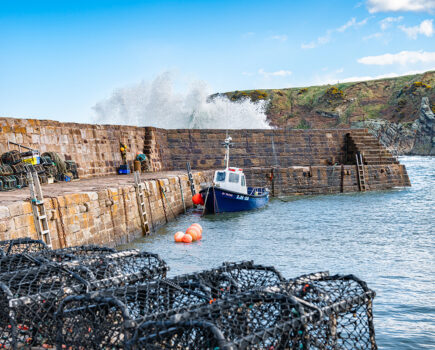Big buyers back damaging changes to fisheries bill
Industry anger at lack of consultation with catchers
A powerful alliance of 22 major supermarkets and seafood processors are pressing the government to adopt major green amendments to the new fisheries bill that would seriously damage the catching sector if they go through, reports Tim Oliver.
The Sustainable Seafood Coalition (SSC) has written to DEFRA secretary of state George Eustice calling for strict implementation of MSY targets for all stocks by 2020, remote electronic monitoring (REM) with onboard cameras on all vessels, and catch limits in line with scientific advice in negotiations with other coastal states.
They point out to the minister that these issues have also been raised by Greener UK, a coalition of 13 environmental organisations.
Their move has been made without any consultation with the catching sector, despite the impact the amendments would have if they are adopted.
NFFO chief executive Barrie Deas said the amendments were ‘completely contrary’ to what the catching sector wanted, and he was ‘disappointed and outraged’ at the way in which the SSC had formed an alliance with the greens without consultation with catchers.
“It’s pretty outrageous the way it’s been done, and I think there’ll be a pushback from the industry,” he told Fishing News.
“It’s an open question as to whether the supermarkets understand what they are signing up to. Their proposals will make the landing obligation and management in mixed fisheries unworkable. I doubt they understand the significance of it. They should have been talking to us and to government.”
The SSC, which includes nearly all the major supermarkets and major processors such as Young’s, have asked George Eustice for a meeting to discuss ‘vital changes’ to be made to the fisheries bill. It was in everyone’s interests to get the bill right, and ‘as major buyers of seafood in the UK, we have particular concerns’, they told the minister.
They acknowledged that the bill is a framework only and not detailed legislation, but say it has a number of weaknesses that could seriously damage the sustainability of UK fisheries.
They say they are committed to responsible sourcing of seafood, and are calling for sustainable fishing limits and ‘robust monitoring and enforcement’.
On sustainable catch limits, they say that the CFP aims to restore stocks above biomass levels capable of producing maximum sustainable yield (MSY) and includes a legal commitment to fish in line with MSY by 2020. But, they say, the fisheries bill regresses from these standards and instead ‘relies merely on aspirational objectives and as yet undrafted fisheries management plans’.
“The fisheries bill should commit the secretary of state and fisheries authorities to set fishing limits at or below MSY, in line with international best practice,” says the SSC. “This is vital to protect against short-term political pressure to set catch limits higher than scientific advice, which would lead to overfishing.”
On monitoring and enforcement, the coalition says that ‘to avoid illegal fishing in UK waters, it is vitally important that the UK is able to achieve full and verifiable documentation of catches, including catch certificates’.
“Eradicating illegality in the supply chain is of utmost importance for UK businesses as part of basic due diligence,” the SSC tells George Eustice.
It also calls for ‘clear sustainability criteria’ in relation to negotiations with the EU and other coastal states such as Iceland, Norway and Faroe on the management of shared stocks. This should include a commitment to agree catch limits that are in line with scientific advice.
Barrie Deas said: “The major buyers have been coaxed into this move which, if successful, would mean the retention of some of the most rigid inflexible parts of the CFP, some of which have seriously undermined effective fisheries management, especially of mixed fisheries.
“I don’t for a second think that the government will accept the amendments that have come down from the Lords, because they would, if accepted, make the UK fisheries inoperable.
“We are about to escape from the CFP, whose main flaw has been its overcentralisation and inflexibility. Why would fisheries managers and the fishing industry want to tie themselves back into arrangements that are in some respects even more rigid than the CFP?
“The buyers who have signed this are either gullible and ill-informed, or intimidated – I’m not sure which.”
Elspeth Macdonald, chief executive of the SFF, said that the SFF supports the fisheries bill as originally introduced to parliament in January, as the right framework legislation for fisheries management for the future.
She told Fishing News: “We must learn the lessons of the CFP and avoid constructing a prescriptive and inflexible set of rules in the bill that can’t respond to the dynamic natural systems that our industry relies upon. SFF looks forward to working with both Scottish and UK governments on the fisheries management plans that will flow from this framework bill.”
Signatories to the letter
The 22 signatories to the SSC letter are: Tesco, Waitrose & Partners, The Co-op, Marks & Spencer, Sainsbury’s, Morrisons, Lidl GB, Whitby Seafoods, Lyons Seafoods, Bidfood, Hilton Seafood UK, Direct Seafoods, Young’s, New England Seafood International, the National Federation of Fish Friers, The Big Prawn Co, World Wise Foods, Seafresh Group, Joseph Robertson Ltd, The Happy Prawn Co, Lynx Purchasing and Meridian Sea.
‘Greens trying to replicate CFP in UK’
Reflecting on the passage of the fisheries bill and the influence of environmentalists on the process, Barrie Deas said that the bill was ‘the green lobby’s last hurrah’, and that in the wake of Brexit they were trying to replicate the CFP in UK legislation.
He did not think the green amendments tabled in the Lords would be finally adopted as they stand as the bill makes its way through the parliamentary process. He believed the government would use its 80-seat majority, if forced to do so, and the elected House of Commons would ultimately prevail.
“I don’t think the government will allow this to impede the central thrust of the bill,” he said.
“The bill was well conceived at the outset, and the government learned the lessons of the CFP. They don’t want to go back into a situation where the contradictions in the CFP are just replicated in domestic UK fisheries management. They need and want to learn the lessons of the CFP.
“What the amendments do for the most part in terms of sustainability is to reintroduce those elements of the CFP that were most problematic and make things more difficult, especially in terms of managing mixed fisheries.”
He said that the CFP was ‘a coercive approach to fisheries management’, and that the government understood that this approach doesn’t deliver sustainable fishing and profitable fisheries.
“That’s why they’ve gone down the road of co-management, and having individual management plans where the people who are affected by the management plans have a say in shaping them,” he said.
“The greens have lost the leverage they had in the CFP and are trying to replicate it within domestic fisheries management. I don’t think the government will give way very much.
“The Lords amendments were extreme, particularly the sustainability one, and overturned the main thrust of the legislation.
“My feeling – and it’s just a feeling – is that the government won’t be swayed into agreeing to amendments that undermine the central thrust of the bill, having learned the lessons of the CFP.”
He hoped that the bill’s passage would be concluded by mid-October, but said that there would then be a ‘huge’ amount of work to be done.
“The fisheries bill is a framework bill only – then it’s up to us to develop these individual management plans.”








